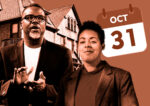Business industry groups have mounted a legal challenge to Mayor Brandon Johnson’s transfer tax proposal.
The groups, spearheaded by the Building Owners and Managers Association of Chicago, filed a lawsuit on Friday against the Chicago Board of Election Commissioners, according to a BOMA news release.
If approved by voters, the real estate transfer tax rate would jump to 2 percent for sales between $1 million and $1.5 million, while rising to 3 percent for transactions greater than $1.5 million. The rate would drop to 0.6 percent for property trades less than $1 million, affecting the majority of home purchases. The additional tax is intended for supportive services to combat homelessness. Proponents estimated that the tax would generate an additional $100 million in revenue.
“Homelessness is a critical issue in our city that should be addressed with a serious plan involving all stakeholders,” BOMA/Chicago Executive Director Farzin Parang said in the release. “These important public policy questions should be presented to voters with fairness, detail, and transparency.”
Mayor Johnson’s office did not immediately respond to a request for comment.
The proposal is set to go to a March 19 ballot referendum, and the lawsuit is seeking an injunction that would pull the proposed transfer tax question from the ballot. The groups contend that the wording of the question violates the Illinois Municipal Code and Illinois Constitution
The question asks voters to approve three policies at once, including a tax decrease, which is intended to manipulate voters into approving two tax increases, they contend.
The question’s structure makes the referendum unconstitutional, because it “prohibits residents from voting on the three individual policy points,” the release said.
It is “unlawful for the tax decrease to be included in the referendum at all,” it said.
Illinois statute requires a referendum to impose a transfer tax or increase an existing one. That law was intended to limit the practice of “legislative log-rolling,” or bundling unpopular legislation with popular items to ensure they pass.
If the lawsuit succeeds, it would be a blow to Johnson’s agenda and limit the funds available for city hall to allocate toward housing.
Critics of the transfer tax proposal say it would negatively impact the real estate industry. While it’s been nicknamed a mansion tax, commercial properties would be the main source of revenue for the tax. It could further decimate struggling office buildings’ value, resulting in a loss of commercial property tax and driving up residential property taxes, they say.
Here is the wording on the ballot, via BOMA:
Shall the City of Chicago impose:
1. a real estate transfer tax decrease of 20% to establish a new transfer tax rate of $3 for every $500 of transfer price, or fraction thereof, for that part of the transfer price below $1,000,000 to be paid by the buyer of the real estate transferred unless the buyer is exempt from the tax solely by the operation of state law, in which case the tax is to be paid by the seller; AND
2. a real estate transfer tax increase of 166.67% to establish a new transfer tax rate of $10 for every $500 of transfer price, or fraction thereof, for that part of the transfer price between $1,000,000 and $1,500,000 (inclusive) to be paid by the buyer of the real estate transferred unless the buyer is exempt from the tax solely by the operation of state law, in which case the tax is to be paid by the seller; AND
3. a real estate transfer tax increase of 300% to establish a new transfer tax rate of $15 for every $500 of transfer price, or fraction thereof, for that part of the transfer price exceeding $1,500,000 to be paid by the buyer of the real estate transferred unless the buyer is exempt from the tax solely by the operation of state law, in which case the tax is to be paid by the seller?
Read more



